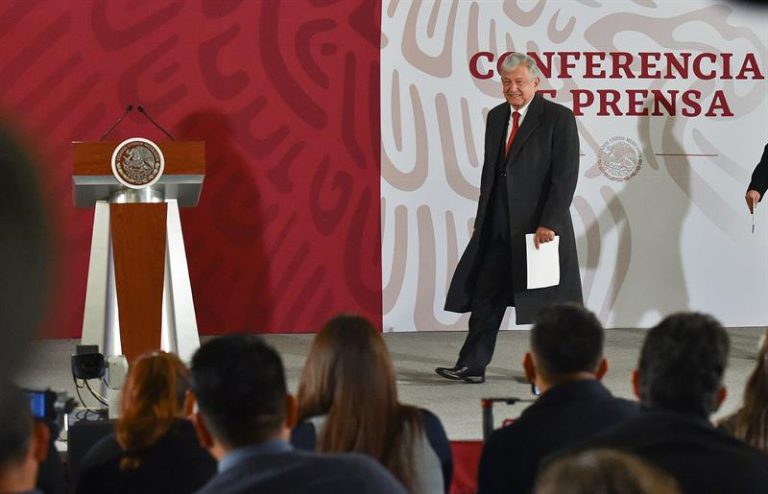17 de enero 2019

News About Sheynnis Palacios Not Covered by Media Operating in Nicaragua

PUBLICIDAD 1M
PUBLICIDAD 4D
PUBLICIDAD 5D
In contrast to Mexican President Lopez Portillo’s position against Somoza in 1978, Lopez Obrador hasn’t spoken about the Ortega dictatorship.

In contrast to Mexican President Lopez Portillo’s position against Somoza in 1978
Along the Paseo de la Reforma, Mexico City’s main boulevard, the faces of the 43 students from the Ayotizinapa Rural Teachers’ Training School are prominently displayed. The students all disappeared in 2014 outside the small city of Iguala, some 138 miles south of Mexico City. Their portraits are a reminder of the campaign promise made by now-president Andres Manuel Lopez Obrador – known as AMLO by his supporters – to make the struggle against impunity, principally in relation to human rights violations, one of the pillars of his six-year term.
However, it seems that this same vehement condemnation won’t be applied to human rights violations outside Mexican territory, such as the case of Nicaragua where Daniel Ortega’s dictatorship has been accused of crimes against humanity.
The platform of Lopez Obrador’s political party, MORENA [Movimiento de regeneracion nacional or National Regeneration Movement] is confusing to the Mexican analysts who try to decipher what his foreign policy might be, especially towards regimes like Ortega’s or that of Nicolas Maduro in Venezuela. The latter rulers see in AMLO’s ascent to power a possible support or at least a neutral element in their favor, at moments when the rest of the region has isolated them due to their serious human rights abuses and violations of democracy.
Lopez Obrador himself hasn’t offered a lot in terms of explaining what his international politics might look like. On Monday morning, January 14, during a press conference with the national media in the National Palace, he reaffirmed his campaign position that he’d maintain a policy of non-intervention in the internal affairs of other countries, and that for him the optimal foreign policy is aimed at solving the problems that affect Mexicans.
This position was stated in response to a question from a reporter from El Heraldo, a daily newspaper from this city, who questioned him regarding his decision not to sign the letter from the so-called Lima Group. In that document, the members refuse to recognize Maduro’s second term, considering that the last presidential elections in Venezuela lacked legitimacy.
AMLO justified his stand on Maduro, assuring that in terms of foreign policy, “We’re going to respect the constitutional principles of non-intervention and of people’s right to self-determination. We’re not going to get mixed up in the internal affairs of other countries, because we don’t want other governments to involve themselves in affairs that correspond only to the Mexicans.”
However, at Maduro’s inauguration, the Mexican leader limited his participation to delegating the head of trade of the Mexican embassy in Caracas to attend the ceremony. This generated still more perplexity among Mexican analysts, who fear that Mexico will isolate itself from its Latin American allies.
A “regrettable” step backwards
“His policy of non-intervention is an extraordinary and regrettable step backwards in a debate I thought we’d put behind us,” stated Sergio Aguayo, a Mexican scholar, a professor at Harvard University, and one of the founders of the Mexican newspaper La Jornada, the first leftist paper in Mexico.
“It’s a return to very negative periods of Mexican foreign policy. The drama of the new Nicaraguan revolutionaries is that they have very little base of support among the Mexican left, which prefers to maintain a complicit silence with AMLO,” Aguayo added, referring to the demonstrators who’ve been demanding since April an end to the dictatorship in Nicaragua and who’ve suffered brutal repression from Ortega and his wife and vice president Rosario Murillo.
The academic’s mention of a regression in Mexican foreign policy is based on the important role that Mexico has historically played in different international crises, such as the one in Nicaragua at the end of the seventies, when the government of Jose Lopez Portillo was “horrified” by the crimes of the Somoza dictatorship and decided to sever diplomatic relations with Nicaragua in May of 1979.
On that occasion, Lopez Portillo justified his decision by citing “the dramatic, repugnant attack on human rights, the horrendous genocide that’s being committed against the Nicaraguan people”. In addition, he asked other Latin American governments to break off relations with the Somoza dictatorship. The decision of the Mexican leader was well received on the rest of the continent. Analysts consulted in Mexico felt it was key to the subsequent vote in the Organization of American States (OAS) on June 24, 1979, to condemn Somoza and demand an end to the dictatorship in Nicaragua.
On that occasion, according to the archives of the Spanish newspaper El Pais, the OAS recommended the immediate and definitive exclusion of the Somoza regime, the installation of a democratic government in Nicaragua, guarantees of respect for the human rights of all Nicaraguans and the realization of free elections as soon as possible.
Mexico “not paying attention” to Nicaragua
Nearly forty years after that important Mexican decision, President Lopez Obrador seems not to understand the impact of his country’s foreign policy in issuing that condemnation of Somoza’s regime. It maintains an eloquent silence about the Nicaraguan crisis and the crimes against humanity that the Interdisciplinary Group of Independent Experts confirmed during their six months of investigations in the country.
“It’s a topic that hasn’t made a big splash in Mexico,” affirms Rafael Fernandez de Castro, a former presidential advisor on international relations and founder of the Department of International Studies of the Autonomous Technical Institute of Mexico. “We have our own crises, a permanent one with the United States. We have a new government enmeshed in a critical gas shortage. I feel that Mexico isn’t paying much attention to the topic of Nicaragua,” explains Fernandez de Castro.
Fernando de Castro recalls that the Nicaraguan crisis during Somoza’s dictatorship lasted for decades and “unfortunately for the people who are suffering, international public opinion takes a long time to react.”
“It’s still unclear what might be expected from AMLOs foreign policy. The foreign minister says that democracy and human rights are essential for Mexico’s foreign policy, but there’s no clear script for what this policy might be. The issue of his failure to sign the Lima Document is also unclear. His refusal to sign doesn’t necessarily mean that he’s not going to look for a solution to the conflict in Venezuela, or that the human rights of Venezuelans don’t concern him,” the expert of international relations explains.
In the case of Nicaragua’s political crisis, Fernandez de Castro feels that “it’s too early to judge” the role that Mexico might play. “There aren’t any clear signals. From the Mexican point of view, the Venezuelan crisis overshadows that of Nicaragua; not because there’s any less of a crisis in Nicaragua, because there are crimes against human rights and a lot of Nicaraguan migrants crossing Mexico in an attempt to reach the United States, a phenomenon never seen before.
But it’s a crisis in the shadows in Mexico, because the Venezuelan situation, and the Venezuelan exodus overshadows it, and because here we’re experiencing a permanent situation of crisis, especially with the caravan of Hondurans.”
The Estrada Doctrine
The Mexican press, on speaking about the foreign policy of the new government, feels that AMLO will turn to the old “Estrada Doctrine” as the former centerpiece of Mexico’s relations with its neighbors was called. It was developed by Gerardo Estrada, at that time foreign relations secretary for President Pascual Ortiz Rubio and was adopted as state policy in 1930.
In general terms, the “Estrada Doctrine” establishes that Mexico won’t intervene in the internal affairs of other nations and that it will respect the self-determination of other peoples. “The Mexican government limits itself to merely maintaining or retiring, when they feel it appropriate, their diplomatic personnel, without precipitously judging, even in hindsight, the right of nations to accept, maintain or substitute their governments or authorities,” reads the original text of the Estrada doctrine.
For Ruben Aguilar, journalist, former guerrilla and government spokesperson under former president Vicente Fox, the fact that AMLO is wrapping himself in the “Estrada Doctrine” reveals an interest in “self-protection, so that no one can attack him on an international level.” However, Aguilar affirms that AMLO is a pragmatist, with a “fierce political intuition.” For that reason, he asserts, if at some moment the case of Nicaragua becomes “politically profitable” to him, he might take a stand “out of his political interests”. For the moment, he says, in terms of foreign policy, the “Estrada Doctrine” “is fantastic” for Lopez Obrador.
“If Mexico wants to become once more an important actor in international politics, it will have to define its postures. Right now, they’re within a conservative and almost incomprehensible agenda, but it can evolve,” recommends Sergio Aguayo.
Judging by what happened on Friday in the OAS Permanent Council, during which session Mexico never asked to speak, in contrast to the former sessions where its ambassador was one of the most belligerent critics of Ortega, it seems that Nicaragua will be far from a priority of AMLO’s administration. “He’s indifferent, it’s not his priority”, assures Ruben Aguilar.
—
UPDATE: Maximiliano Reyes, appointed as Undersecretary of Foreign Affairs for Latin America of the government of Mexican President Andrés Manuel López Obrador, said Wednesday that Mexico is willing to mediate to find a way out of the profound political crisis that Nicaragua suffers since April, when the protests against Daniel Ortega began.
Reyes said that Nicaraguan Foreign Minister Denis Moncada will visit Mexico on Thursday, although he did not elaborate on whether this country will express its proposal to mediate the crisis.
“Mexico would be willing to participate, at the invitation of Nicaragua, in any mechanism for facilitating and mediating the dialogue that would allow the parties in conflict to approach with full respect for their internal affairs and self-determination,” the official said.
Archivado como:
PUBLICIDAD 3M
PUBLICIDAD 3D